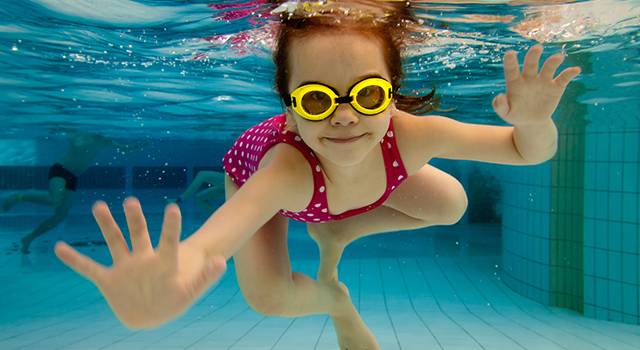Did you know that swimming with contact lenses can pose serious risks to your eye health? While it may seem convenient to keep your lenses on while taking a dip, it's essential to understand the potential hazards involved.
At Red Cedar Optometry, we want to educate you about the potential risks and help protect your eyes while swimming. We will delve into the common issues that can arise from swimming with contact lenses and provide valuable insights on safeguarding your precious vision.
So, dive in with us and discover how to keep your eyes safe and healthy!
Common Issues Caused By Swimming with Contact Lenses
Eye Irritation
Eye irritation can be a significant concern when swimming while wearing contact lenses. Water has the potential to warp the shape of your lenses, and chemicals like chlorine can have a detrimental effect on your eyes. It's common to experience redness, itchiness, and discomfort when your lenses interact with water during swimming sessions.
Eye Infections
Contact lenses can absorb chemicals and bacteria in the water, raising the chances of developing an eye infection like conjunctivitis (pink eye). However, a more severe concern is acanthamoeba keratitis, which can take up to a year to treat.
Acanthamoeba keratitis is a particularly dangerous infection. Acanthamoeba, a microscopic organism found in water sources, can adhere to your lenses and enter your eyes when exposed to water containing the organism. This infection can cause severe eye pain, redness, inflammation, sensitivity to light, blurred vision, excessive tearing or discharge, and a feeling of a foreign body in the eye.
A study published in the Journal of Optometry in 2021 found that individuals who swim with contact lenses have a significantly higher risk of Acanthamoeba keratitis than those who remove their lenses before swimming.
Corneal Ulcers
Swimming with contact lenses can also put you at risk of developing corneal ulcers. These ulcers occur when your cornea becomes inflamed or infected due to exposure to chemicals or bacteria. Corneal ulcers can cause pain, irritation, light sensitivity, and difficulty opening your eyes. Without proper treatment, they can lead to permanent vision problems. Let us help you understand the potential risks of corneal ulcers and how to prevent them.
Losing Your Contact Lenses
Swimming activities pose a higher risk of losing contact lenses due to water pressure, vigorous movements, or accidental rubbing of the eyes. Losing a contact lens in the water can be frustrating and inconvenient and may even increase the chances of eye irritation or infection.
Different Water Sources, Different Risks
 Not all water sources are equal regarding their impact on your contact lenses and eye health. Let's explore the differences and risks associated with various water sources:
Not all water sources are equal regarding their impact on your contact lenses and eye health. Let's explore the differences and risks associated with various water sources:
Swimming Pools: Chlorinated Protection?
While chlorinated swimming pools are generally considered safer due to the presence of disinfectants, it's important to note that chlorine may not effectively combat Acanthamoeba, the organism responsible for Acanthamoeba keratitis. Avoid exposing your lenses to pool water is advised to reduce the risk of infection.
Saltwater: A Dehydrating Danger
Swimming in the ocean or saltwater bodies can lead to discomfort and lens dehydration. The high salt content can draw moisture from your lenses, causing dryness and irritation. Additionally, microorganisms present in seawater can increase the risk of infections if lenses come into contact with the water.
Freshwater: Hidden Dangers
Lakes, rivers, and other freshwater sources can harbor microorganisms, including Acanthamoeba. Without disinfectants like chlorine, these water sources pose a greater risk to contact lens wearers. Even seemingly clean freshwater bodies can contain hidden bacteria and microorganisms, so removing your lenses before swimming is essential.
Hot Tubs: A Relaxing Risk
Hot tubs are a popular spot for relaxation but can also pose risks to contact lens wearers. The warm water and high temperature provide a breeding ground for bacteria and microorganisms to thrive.
Protecting Your Eyes While Swimming
Now that you're aware of the risks associated with swimming with contact lenses let's explore some essential tips to protect your eyes and maintain optimal eye health:
1. Remove Your Contact Lenses Before Swimming: The best way to avoid the risks is to remove your contact lenses before swimming. This simple step can significantly reduce the chances of eye irritation, infections, and other complications.
2. Use Prescription Swim Goggles: If you require vision correction and want to swim without your lenses, consider using prescription swim goggles. These specialized goggles can provide clear vision underwater while protecting your eyes from potential hazards.
3. Disposable Daily Contact Lenses: If you prefer to wear contact lenses while swimming, consider using disposable daily lenses. These lenses are designed for single use and can be discarded after swimming, reducing the risk of infections associated with reusing lenses.
4. Water-Tight Swim Goggles: If you wear your contact lenses while swimming, wear water-tight swim goggles to minimize water exposure to your eyes. This can help prevent chemicals, bacteria, and microorganisms from coming into contact with your lenses.
5. Proper Contact Lens Hygiene: If you decide to keep your contact lenses in while swimming, ensure you practice strict contact lens hygiene. Clean and disinfect your lenses before and after swimming, following your eye care professional's instructions. Remember to replace your contact lens case regularly to prevent contamination.
6. Regular Eye Exams: Schedule regular eye exams with your eye care professional to monitor the health of your eyes.
They can assess any potential damage caused by swimming with contact lenses and provide appropriate treatment or recommendations.
At Red Cedar Optometry, we recommend removing your contact lenses before swimming in any water source to ensure your eye health and safety. Our team can provide further guidance and assist you in finding alternative vision correction options suitable for water activities.
Contact Red Cedar Optometry to schedule an appointment and ensure your eyes receive the care they deserve.

